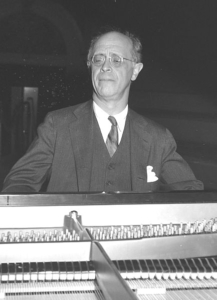REVIEW POTPOURRI – Pianist: Rudolf Serkin
 by Peter Cates
by Peter Cates
Rudolf Serkin
Back during my college years, I considered Rudolf Serkin (1903-1991) my favorite pianist. He played with a most engaging combination of rhythmic muscularity, musical virtuosity, and fervent heart and soul in whatever work he was giving his total attention to. I grew up with his Columbia Masterworks LP of Beethoven’s Emperor Concerto with Leonard Bernstein and the New York Philharmonic from 1962 (It contained recording session photos including one of Bernstein smoking a cigarette – he smoked four or five packs a day, had suffered from emphysema since he was 29, and was carrying air the last two years of his life before he passed away in 1990. For what it’s worth, Serkin was not smoking.). The performance blazed and roared with fiery passion and ethereal beauty especially in the slow 2nd movement. Other more lyrical performances of that work seemed tepid by comparison. Nowadays, I find the Emperor can stand a variety of approaches and have a few dozen different recordings.
I have previously written of my enthusiasm for the Brahms 1st Concerto and was then very dogmatically opinionated in musical preferences, and considered Serkin the finest interpreter of it. In April, 1974, I was the classical record buyer for the Kenmore Square Discount Records and heard that Serkin would be collaborating with the Boston Symphony under its then recently appointed music director Seiji Ozawa at Symphony Hall the next day in a Sunday afternoon pension fund concert. I called the box office and found out that tickets were still available, took a $2 cab ride to and from the hall, and, having only $20 to get me through the following week, paid $10 for my ticket, subsisting on baloney sandwiches with mustard on white bread until the following Friday pay day.
I had seen Serkin on television and was captivated by how he would hum at the piano and conveyed such joy. His hand movements were phenomenal to observe and my seat in the balcony would provide a view of them.
Before the Brahms, Ozawa conducted vibrant performances of Maurice Ravel’s showpieces, Menuet Antique and the complete Mother Goose ballet. After intermission, Serkin entered on stage with the conductor and, from his posture on the bench, seemed tired and frail during the five minute orchestral introduction. However, just before his entrance, the pianist sat up erect, flexed his fingers and gave the performance of his life. I was shaking with goosebumps and tears.
He recorded the piece four times – with Fritz Reiner and the Pittsburgh Symphony in 1946, twice with George Szell and the Cleveland Orchestra – 1952 and 1968, and with Eugene Ormandy and the Philadelphia Orchestra in 1961. I have all four and cherish them for different reasons. Serkin was rarely satisfied with his recordings and welcomed the challenge of re-doing them, as did Artur Rubinstein.
Most of Serkin’s recordings can be heard on YouTube. His son, Peter Serkin (1947 – 2020), was also a very distinguished pianist.
Robert P.T. Coffin
More from Robert P. Tristram Coffin’s essay, Kennebec Crystals:
“Women swept past, little crepe bonnets cocked over the left eye and eyes like jets and blue diamonds. The ice was marked off into lanes, the racing sleighs came out. Horses came up the river, neck and neck, the flowers of their breaths festooned each side of them like garlands hung from high head to high head. Whips cracked, and shouts sent out long echoes each way. The chipped ice shone like splinters flying from a rainbow. Young men had young arms around waists of only 18 inches, and young people started off on the road to matrimony on the thinnest of bright steel shoes.”
More next week.
Of related Maine history interest is the Facebook page, Old Pictures of Forgotten Maine.
Responsible journalism is hard work!
It is also expensive!
If you enjoy reading The Town Line and the good news we bring you each week, would you consider a donation to help us continue the work we’re doing?
The Town Line is a 501(c)(3) nonprofit private foundation, and all donations are tax deductible under the Internal Revenue Service code.
To help, please visit our online donation page or mail a check payable to The Town Line, PO Box 89, South China, ME 04358. Your contribution is appreciated!



Leave a Reply
Want to join the discussion?Feel free to contribute!